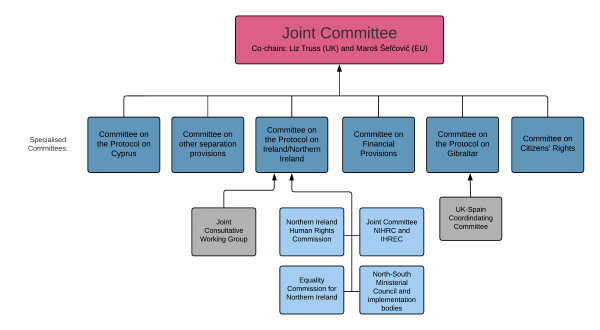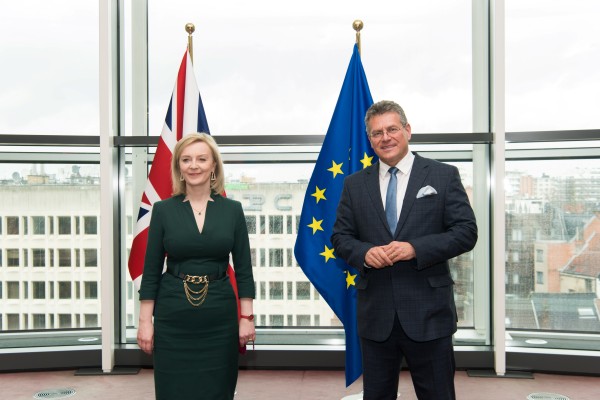Brexit & Beyond Newsletter
22 February 2022
 Welcome to the 22 February 2022 Brexit & Beyond newsletter
Welcome to the 22 February 2022 Brexit & Beyond newsletter
Yesterday the EU-UK Joint Committee, which oversees the Withdrawal Agreement, met in Brussels to discuss the Protocol on Ireland/Northern Ireland, and citizens’ rights. There was no breakthrough in the negotiations, which have been underway for several months, and talks are set to continue. Northern Ireland Assembly Committees continue their scrutiny of Common Frameworks. A report from the Commons European Scrutiny Committee highlights EU proposals on pollutant regulations which Northern Ireland would have to follow under the Protocol.
Joint Committee meets in Brussels
The EU-UK Withdrawal Agreement Joint Committee met yesterday in Brussels. The Joint Committee is responsible for the implementation and application of the EU-UK Withdrawal Agreement. While the chief negotiators (European Commission Vice-President Maroš Šefčovič and UK Foreign Secretary Liz Truss) have been meeting regularly, this is the first formal meeting of the Joint Committee since June 2021. Find out more about the Joint Committee on our website. On the agenda was the Protocol on Ireland/Northern Ireland, citizens’ rights and a stocktake of the activity of the Specialised Committees. Junior Minister Declan Kearney represented the Executive Office at the meeting.
 Governance of the Withdrawal Agreement
Governance of the Withdrawal Agreement
The UK and the EU released a joint statement following the meeting, saying Maroš Šefčovič and Liz Truss “underlined the ongoing determination of both parties to ensure that the outstanding issues in the context of the Protocol are addressed, and durable solutions found for the benefit of citizens, businesses and stability in Northern Ireland.” Vice-President Šefčovič and Foreign Secretary Truss also “reiterated the importance of further engagement, including with the Northern Ireland Assembly and Executive, and wider Northern Ireland civic society and business.” Vice-President Šefčovič spoke the press following the meeting. He described the talks as “neither a breakthrough, nor a breakdown” and said he and Foreign Secretary Truss “are determined to keep our eyes on the ball to find durable solutions.”
Last week, Irish Government Foreign Minister Simon Coveney met with party leaders in Northern Ireland and played down the prospect of a breakthrough in talks.
Šefčovič was asked about progress on customs arrangements, given previous speculation that agreement could be closer in this area. Šefčovič highlighted that over 100 meetings have taken place with the UK and customs is the area where the sides “understand each other more…and will be able to move forward”. He said he has an “excellent” relationship with the UK Foreign Secretary and appreciates the “personal involvement and investment” she is putting into the issue. RTÉ reports that the EU raised moving the talks to a more “discreet” phase at the Joint Committee meeting, ahead of elections in Northern Ireland. Tony Connelly’s report and Twitter thread covers discussions about customs procedures and EU concerns about the protection of its single market. The BBC also has a write-up of the Joint Committee meeting.
 European Commission Vice-President Maroš Šefčovič and UK Foreign Secretary Liz Truss in Brussels | Source: European Union, 2022
European Commission Vice-President Maroš Šefčovič and UK Foreign Secretary Liz Truss in Brussels | Source: European Union, 2022
Yesterday the EU published factsheets on its proposals on medicines, customs, SPS measures, and stakeholder engagement. On stakeholder engagement, the EU proposes more structured engagement with Northern Ireland stakeholders, and increased transparency of the Joint Consultative Working Group.
Polling on the Protocol
Queen’s University Belfast will be publishing its latest report on the views of voters in Northern Ireland on Brexit and the Protocol on Thursday as part of its Post-Brexit Governance NI project. The report will be available here. QUB’s most recent poll was carried out in October 2021, when 69% of respondents said particular arrangements for Northern Ireland are necessary to manage the impact of Brexit. A narrow majority - 53% - saw the Protocol as the appropriate means for managing the impact of Brexit on Northern Ireland. 59% saw the Protocol as impacting negatively on political stability in Northern Ireland.
Scrutiny of Common Frameworks
On Thursday 17 February, the Committee for Agriculture, Environment and Rural Affairs heard evidence from stakeholders on the Agricultural Support Common Framework and the Chemicals and Pesticides Common Framework.
Agricultural Support
The Agricultural Support Common Framework sets out how the UK Government and devolved governments propose to work together on agricultural support policies, including agricultural spending and associated regulation and enforcement. Ian Stevenson of the Livestock and Meat Commission told the Committee that in principle, the Agricultural Support Framework sounds like a good idea, in terms of managing the risk of divergence and issues relating to the internal market. However, he questioned how effective it will be when tested and when a dispute arises: “it looks effectively like a gentleman's agreement: you know, it's non-legislative, so you have to query how will the system stand up to a test.”
William Irvine of the Ulster Farmers' Union agreed that in principle, the framework is a good and sensible approach. However, he raised issues around access to products under the Protocol, in particular plant protection products: he said they thought they would have access to both the EU and UK markets, but that when there's divergence between the EU and UK positions, “rather than being able to access both, we end up with a no man's land, where we can access neither of the products.” He said trying to live under two regulatory regimes “leaves us in a difficult place”. Irvine added that divergence on plant protection products, and on animal medicines “has the potential to be huge and [have] significant impacts to Northern Ireland.” He said that when Protocol arrangements are enforced at the end of this year, it would put 40% of NI’s animal medicines at risk, adding that this doesn’t just impact the agriculture sector: over half of the animal medicines used in NI are for pets.
Chemicals and Pesticides
The Chemicals and Pesticides Common Framework sets out how the UK Government and devolved governments propose to work together on regulating chemicals and pesticides. Rebecca Allen of NI Water said they are quite content that the protections in this area afforded prior to Brexit and during the transition period are going to continue. Dymphna Gallagher of NI Water emphasised that they can treat the pesticides and herbicides which they know about, but said their biggest fear would be something “which happens underground…because of the political situation, because of the new Recast directive, because of the new regulations and the Protocol etc., that we might face a problem that is an unknown.”
Bruce Steele of the Ulster Arable Society highlighted that there have already been issues on divergence, asking, “If we are having to work under an EU-guided system here…what input will this Framework…have here in reality?” Steele pointed out that Northern Ireland represents 1.3% of the total plant protection product use across the UK: “companies are just saying, you’re not worth the hassle” to produce extra or separate labelling to send products to NI. William Irvine (UFU) added that they have been raising such issues around the Protocol for more than a year with the UK Department for Environment, Food and Rural Affairs and with EU officials: “There's a frustration there that while we have been continually a making our case here, it does not seem to get to the high-level political ears that need to get their head around this.”
On Wednesday 16 February, the Committee for the Economy was briefed on the Company Law Common Framework by the Assembly Research and Information Service (RaISe).
Last week, the UK Government published provisional Common Frameworks on Fisheries Management and Support, Food Composition Standards and Labelling, Ozone Depleting Substances and Fluorinated Greenhouses Gases(F-gases).
EU proposals and interaction with the Protocol
On 15 February 2022, the Commons European Scrutiny Committee published its 17th report, which covers EU proposals on pollutants which will apply to Northern Ireland under the Protocol. The plans would make current controls on restricted chemicals in waste in the EU and Northern Ireland more stringent than in Great Britain. The report highlights additional costs - potentially more than £1m annually - associated with EU plans which would see construction waste in NI diverted from landfill to incinerators in Great Britain, and collections for ash from domestic wood and coal burning potentially separated. The UK Government’s Explanatory Memorandum on the EU proposal on persistent organic pollutants notes that it covers a policy area that is subject to the Common Framework on Chemicals and Pesticides and has links to the Waste and Resources Common Framework.
The Committee’s report also considers the potential impact of the EU Emissions Trading System (ETS), a Carbon Border Adjustment Mechanism, livestock movements to Northern Ireland, and access to benefits and healthcare under the Withdrawal Agreement.
This Week at the Assembly
- Tuesday 22 February, 1PM – Plenary - Consideration Stage: Motor Vehicles (Compulsory Insurance) Bill
- Tuesday 22 February, 2PM – Plenary - Question Time – Economy
- Tuesday 22 February, 5PM – Plenary - Motion: The draft Environment (2021 Act) (Commencement and Saving Provision) Order (Northern Ireland) 2022
- Wednesday 23 February, 11.15AM - Committee for Infrastructure - Departmental Briefing - Draft Railway (Safety Management) (Amendment) (EU Exit) Regulations
- Wednesday 23 February, 12.20PM - Committee for the Economy - The Provisional Late Payments (Commercial Transactions) Common Framework - Research and Information Service (RaISe) Briefing Paper
- Thursday 24 February, 11.15AM - Committee for Agriculture, Environment and Rural Affairs - The Plant Health & Plant Varieties & Seeds Common Frameworks - Stakeholder Oral Evidence Session; EU Exit legislation
Catch up with Assembly Business
- Wednesday 16 February, 11.35AM - Committee for the Economy - Company Law Common Framework - Briefing from Research and Information Service (RaISe)
- Thursday 17 February, 10AM - Committee for Agriculture, Environment and Rural Affairs - Common Frameworks on Agri-Support; Chemicals and Pesticides - Stakeholder evidence; EU Exit legislation



